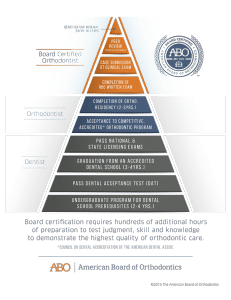Are all pediatric dentists/orthodontists Board Certified?
No. All pediatric dentists and orthodontists must be licensed to practice, but at this time only a small percentage of these specialists have continued on to become a board-certified. The board certification process signifies a unique achievement—a significant step beyond the three years of advanced education required for a dentist to become a specialist in pediatric dentistry and orthodontics. The process requires the specialist to demonstrate actual accomplishments in patient care with detailed case reports on the treatment provided for a broad range of patient problems. Board certification is a voluntary achievement that not all pediatric dentists or orthodontics choose to pursue. In order to become board certified by the American Board of Pediatric Dentistry (ABPD) and American Board of Orthodontics (ABO), an individual specialist is thoroughly interviewed by a highly respected panel of examiners to demonstrate their dental knowledge, clinical skills and judgment.
Why would a pediatric dentist/orthodontist choose to complete this voluntary board certification process?
Successful completion of the examination process demonstrates the specialist’s highest commitment to excellence in their field – to both the pediatric dental and orthodontic profession and the general public. It represents a commitment by a licensed specialist that he/she has the necessary knowledge base and skills to treat patients to the highest of standards. It exemplifies a practitioner’s commitment to continue to keep abreast of the latest advances in patient care, and to continue to deliver these latest advances to patients. Many pediatric dentists and orthodontists see it as a demonstration of their dedication to the specialty and the highest level of personal achievement.

What steps are required to complete the board certification process?
Since the establishment of the ABPD and ABO in 1940 and 1929, respectively, the certification process requirements have continued to adjust to the demands of the specialties. Today, the process involves a thorough written examination covering all areas of information which a pediatric dentist and orthodontist should be knowledgeable. Successful completion of this “qualifying exam” allows the candidate to proceed to the second part of the board evaluation.
The ABPD Oral Clinical Exam consists of multiple clinical scenarios presented from a panel of examiners. Examiners will ask open ended questions to assess the candidate’s knowledge and skills on all aspects of pediatric dentistry. Upon successful completion of this, the pediatric dentist has achieved Board Certification. In order to maintain board status, the pediatric dentist must complete yearly requirements in the form of examinations and continuing education to meet the rapidly changing science and technology, and to provide the highest quality care to the patients.
During the ABO Clinical Examination, the candidate presents detailed case reports from their practice/residency, demonstrating a history of excellence in patient care. These cases are evaluated by a panel of examiners and later discussed during an oral examination where the applicant is tested on a wide variety of academic and clinical topics. After successful completion of these examinations, the orthodontist has officially achieved Board Certification, for a time-limited period. The orthodontist must go through Certification Renewal every 10 years to maintain their certification status by demonstrating this continued level of patient care.
For further information about The American Board of Orthodontics and Board Certification, click here.